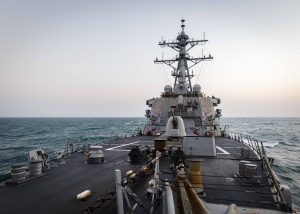A recently conducted joint patrol of the South China Seas (SCS) between the United States, Australia, Japan, and the Philippines marked the first combined multinational maritime patrol in those contested waters. It’s about time.
Freedom of Navigation operations, or FONOPs, have served a critically important role in U.S. diplomacy and security for decades. Since 1979, the U.S. FONOPs program has asserted U.S. rights and freedoms around the globe in accordance with international norms and the United Nations Convention on the Law of the Sea. After the U.S. Department of State diplomatically protests unlawful restrictions on navigational rights, the U.S. Department of Defense (DoD) conducts sailing and flying operations that are both compliant with international law and designed to challenge the unlawful restrictions. FONOPs are routinely executed as peaceful, objective protests, and, though they do not address competing territorial sovereignty claims or maritime boundary disputes, are an essential part of U.S. global security strategy.
The recent show of force by the joint patrol and the announced intention for more operations in the South China Sea represents a meaningful step forward in countering Chinese aggression in the region. But will it be sustained?
In 2020, as the deputy assistant secretary for policy overseeing oceans policy, I encouraged allied and partner countries to conduct FONOPs whenever feasible to demonstrate power to combat unlawful maritime claims. In fact, 2019 and 2020 saw the most South China Sea FONOPs in the history of the program, consistent efforts that supported the 2018 National Defense Strategy (NDS) – the first to identify China as America’s strategic competitor. The 2018 NDS specifically called out China’s blatant predatory economic practices and its efforts in “militarizing features in the South China Sea.”
I was pleased to see that President Joe Biden’s 2022 NDS correctly adhered to the direction of the 2018 strategy. And, after leaving the Pentagon in 2021, I and others called for the U.S. to continue the steady drumbeat of FONOPs. I also urged defense officials to seek partnership with like-minded countries to establish their own formal programs in support of the law of the seas.
Unfortunately, the recent joint patrol is the exception that proves the rule: to-date, the Biden administration has generally not maintained the sustained tempo of FONOPs established by the Trump administration.
During 2021, according to government reports, U.S. Navy FONOPs in the South China Sea were reduced by more than 25 percent from the previous two years, and many of the operations that did occur were actually approved prior to Biden taking office. The number of FONOPs in the disputed waterway remained stagnant in 2022, 2023, and the first part of 2024.
Meanwhile, China has increased its destabilizing military conduct in the area with little regard to international law and norms. China has improved military outposts on existing islands, as well as built artificial ones throughout the South China Sea. According to DoD, the Chinese military routinely conducts reckless maneuvers in the air, coercive actions at sea, and asserts control of natural resources within the exclusive economic zones of other nations. Moreover, China continues to support Russia’s war in Ukraine, prop up the North Korean dictator, and side with Hamas over Israel.
The United States must counter China’s actions in the South China Sea with two sufficient reactions. First, the U.S. Navy must return to, or exceed, the tempo of South China Sea FONOPs established in 2019 and 2020. This is a DoD policy position, made in coordination with the State Department, that can and should be adopted today.
Second, joint maritime patrols should be expanded to include the United Kingdom and India. Doing so would send a strong signal to China, which currently has the world’s largest navy in terms of total ships, an advantage that is likely to grow in the coming years. While the U.S. Navy remains the world’s most capable, the sheer number of Chinese vessels hinders our ability to singularly ensure commercial and military freedom of the seas in all corners of the world. The environment requires partnerships.
With the U.K. and India included, the joint patrols would include three of the top 10 U.S. trading partners and four of the top six global economies. Moreover, the combined patrols would represent naval power that together far surpasses anything Chinese can muster. Coordinated FONOPs are an opportunity to demonstrate that America is the leader, but also that we do not shoulder the sole responsibility for checking bad actors around the globe.
Chinese aggression in the Indo-Pacific necessitates sustained action, and for now the ball in the Biden’s administration’s court to respond. The right move is to immediately increase and expand FONOPs to demonstrate the leadership and strength necessary to maintain peace. Regardless, should the White House change hands in November, FONOPs in the SCS will undoubtedly receive renewed attention, and PRC leadership will be on notice that their aggression won’t go unchecked.

































